Cats are known to be graceful and elegant animals, but sometimes you may notice your cat walking with a hunched back. This behavior can be caused by a variety of different factors and can be indicative of a medical issue. It’s important to pay attention to your cat’s body language, as this can be a sign of a health problem. In this article, we will discuss why your cat may be walking with a hunched back, as well as the potential causes and treatments.
The exact cause of why your cat walks with a hunched back is not known, however it is likely due to a combination of factors such as age, posture, and muscular issues. Regardless, it is important to take your cat to the vet to rule out any underlying health issues that may be causing the hunched back and to ensure your cat is in good health. With proper care and attention, your cat can still enjoy a happy and healthy life.

Could Your Cat’s Hunched Back Be a Sign of Arthritis?
Yes, your cat’s hunched back could be a sign of arthritis. Arthritis is a common condition in cats that can cause pain and stiffness in the joints. It is especially common in older cats and can lead to difficulty walking and other mobility issues. The most common sign of arthritis in cats is a hunched back. This is due to the cat’s muscles becoming weak and tight from the pain of the arthritic joints. This causes the cat to hunch in an effort to protect the joints from further damage. Other signs of arthritis in cats can include decreased activity, lameness, limping, reluctance to jump, and difficulty climbing stairs. If your cat is displaying any of these signs, it is important to visit your veterinarian for a diagnosis. Your veterinarian will be able to determine if arthritis is the cause of your cat’s symptoms and recommend a treatment plan. Treatment options for arthritis in cats typically include medications, physical therapy, and lifestyle changes such as providing soft bedding, and helping your cat maintain an appropriate weight. It is important to recognize the signs of arthritis in cats and to take action if you suspect your cat may be suffering from this condition. With the right treatment and care, cats with arthritis can still enjoy a happy and healthy life.
Could a Poor Diet Be Behind Your Cat’s Hunched Back?
A poor diet can have a significant and adverse effect on your cat’s health, including its musculoskeletal system. A hunched back, also known as lordosis, is a common outward sign of an underlying problem that can arise from a nutritional deficiency. Lordosis is a condition where the spine of the cat is curved abnormally, causing it to have a hunched posture. While lordosis can have a number of causes, including trauma or injury, it can also be the result of an inadequate diet, particularly one that is deficient in essential vitamins and minerals. Vitamins and minerals are important for the health of all animals, and cats are no exception. A poor diet can lead to deficiencies in these essential nutrients, which can in turn lead to a range of health problems, including lordosis. For example, cats require vitamin A for the proper functioning of their muscles, bones and nerves. A deficiency in this vitamin can lead to the muscles in the spine becoming weak, resulting in lordosis. In addition to vitamins and minerals, cats need a balanced diet that provides the correct amount of calories, proteins and fats. A diet that is too low in these macronutrients can cause your cat to become malnourished, leading to a range of health problems, including lordosis. If you suspect that your cat’s hunched back is the result of a poor diet, it is important to take action to address the underlying nutritional deficiency. Your veterinarian can help you to identify the specific nutrients that are lacking in your cat’s diet and recommend the appropriate supplementation. It is also important to feed your cat a balanced diet that contains the right amount of calories, proteins and fats. By ensuring that your cat receives a nutritionally balanced diet, you can help to ensure its overall health and prevent the development of health conditions such as lordosis.
Exploring the Causes of Your Cat’s Hunched Back
Cats may hunch their backs for a variety of reasons, and it is important to understand the cause of this behavior in order to provide proper care. The most common cause of a cat’s hunched back is pain or discomfort. In these cases, the cat may hunch its back as a protective reflex to guard against further pain and discomfort. Pain or discomfort can be caused by a variety of issues, such as a medical condition, an injury, or even a psychological issue. Medical conditions that can cause a cat to hunch its back include arthritis, joint problems, or spinal disc disease. Injury can be caused by a fall or trauma, or even something as simple as a pulled muscle. Psychological issues can be a result of stress or anxiety. Other reasons cats may hunch their backs include hunger or fear. When cats are feeling hungry, they may hunch their backs as a sign of submission to other cats in the household. If a cat is feeling frightened, it may hunch its back in order to appear smaller and less intimidating. It is important to identify the cause of your cat’s hunched back in order to provide proper care. If your cat is hunching its back due to a medical condition or injury, it is important to seek veterinary care right away. If your cat is hunching its back due to hunger or fear, it is important to address the underlying issue and provide the necessary care. By understanding the cause of your cat’s hunched back, you can take the necessary steps to provide the best possible care for your pet.
What to Do When Your Cat Is Experiencing Back Pain
If your cat is experiencing back pain, it is important to take them to the veterinarian to determine the cause. Back pain in cats can be caused by a variety of conditions, including spinal arthritis, disc disease, or a traumatic injury. In some cases, the source of the pain may be difficult to diagnose without further testing. If your cat is diagnosed with back pain, your veterinarian may recommend a variety of treatments. These may include pain medications, anti-inflammatory medications, muscle relaxants, acupuncture, or physical therapy. Your veterinarian may also suggest a change in diet, as certain conditions may be affected by changes in nutrition. In addition to medical treatments, there are other steps you can take to help your cat manage their back pain. Here are some steps to consider: • Make sure your cat’s environment is comfortable and safe. This means providing them with a soft, supportive bedding and avoiding furniture or other items that may put pressure on their spine. • Encourage your cat to move around and exercise. While this may seem counter-intuitive, moderate exercise can help to keep muscles and joints strong and can reduce stiffness and pain. • Offer your cat massage or heat therapy. Gentle massage can help to relieve tension in the muscles and joints, while heat therapy can increase circulation and reduce inflammation. • Provide your cat with a comfortable carrier or pet stroller when going outside. This will help to minimize any jarring or bouncing movements that can increase pain. By taking steps to reduce your cat’s back pain, you can help them to lead a more comfortable and active life. However, it is important to remember that back pain can be a sign of a more serious underlying condition. If your cat is experiencing back pain, it is best to consult your veterinarian for further advice and treatment.
Understanding the Different Types of Spinal Conditions in Cats
Cats are known to be resilient creatures, but they are also prone to a variety of spinal conditions. It is important to understand the different types of spinal conditions in cats so that they can be identified and treated promptly. This article will provide an overview of the most common spinal conditions in cats. The first type of spinal condition is a herniated disc. This occurs when the soft inner material of the disc, known as the nucleus pulposus, protrudes out of the normal disc space and compresses the spinal cord or nerve root. Symptoms of a herniated disc include hind limb weakness, pain, and difficulty walking. If left untreated, it can lead to permanent paralysis. The second type of spinal condition is spinal cord trauma. This type of trauma can occur due to a fall or a car accident. Symptoms of spinal cord trauma include paralysis and incontinence. This type of injury is typically treated with surgery, physical therapy, and rehabilitation. The third type of spinal condition is intervertebral disc disease. This refers to the degeneration of the discs between the vertebrae. Symptoms of this condition include back pain, stiffness, and weakness. Treatment may include surgery, physical therapy, and medications. The fourth type of spinal condition is spondylosis deformans. This is a condition in which the vertebrae become deformed due to abnormal bone growth. Symptoms of this condition include pain, stiffness, and a hunched-over posture. Treatment may include medications, physical therapy, and surgery. Finally, the fifth type of spinal condition is vertebral fractures. This occurs when the vertebrae become cracked or broken due to a trauma. Symptoms of this condition include pain, instability, and weakness in the affected area. Treatment may include medications, physical therapy, and surgery. It is important to recognize the signs and symptoms of these spinal conditions and seek prompt medical attention. By understanding the different types of spinal conditions in cats, owners can ensure that their cat receives the best possible care.
If you’ve noticed that your beloved cat is walking with a hunched back, you may be wondering what could be causing this behavior. While some cats may simply have a hunched back due to genetics, there are a few potential explanations as to why your cat may be walking this way.One potential explanation is that your cat is experiencing pain or discomfort in the back or abdomen. Cats often hunch their backs in response to pain, so if your cat is exhibiting this behavior, it’s important to take them to the vet for a check-up. Your vet can perform a thorough examination to determine if anything is wrong and recommend the necessary treatment.
Another possible cause of a hunched back is stress or anxiety. If your cat is feeling stressed or anxious, they may hunch their back in order to make themselves appear smaller and less vulnerable. If you suspect that this is the case, it’s important to address the underlying cause of the stress or anxiety to help your cat feel more relaxed and comfortable.
Finally, your cat may be hunching their back due to obesity. If your cat has been overeating, their excess weight can cause them to have a hunched back. This can be a sign of an unhealthy lifestyle and is important to address, as obesity can lead to a variety of health issues. Make sure to feed your cat a balanced diet and give them plenty of exercise to help them maintain a healthy weight.
In conclusion, if your cat is walking with a hunched back, it’s important to consider the potential causes. Pain, stress, and obesity are all possible explanations, so it’s important to take your cat to the vet for an examination and to make sure they are leading a healthy lifestyle. Taking the necessary steps can ensure that your cat is feeling their best and help them to walk with a proud, upright posture.


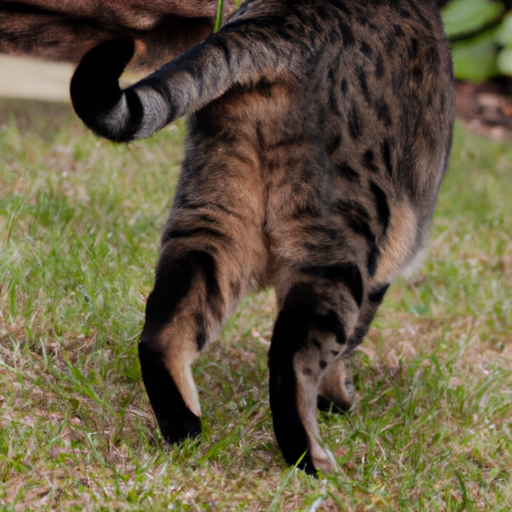
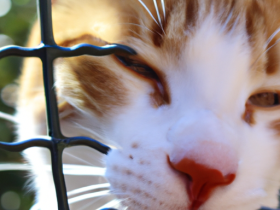

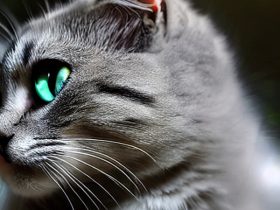
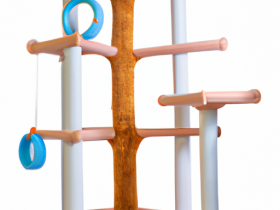
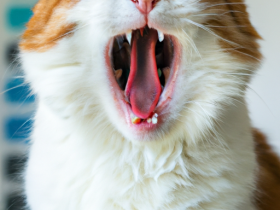
Leave a Reply
View Comments